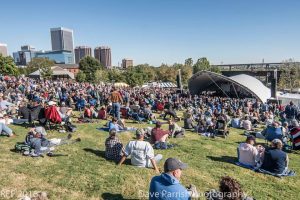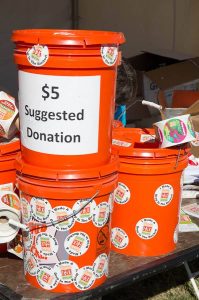With our traffic-cone-colored t-shirts adorned and Home Depot buckets in hand, we were released from the cramped volunteer’s tent, free to roam Brown’s Island at last. The group of Bucket Brigadiers fanned out across the festival grounds in pairs, collecting donations from festival-goers. Initially, I was concerned: how could just a handful of volunteers collect enough money to fund this huge festival? At that point, the field was practically empty save a few small groups of confused guests looking for a schedule of the music for that night. Admission was free and this was turning out to be a perfect tragedy of the commons. Disappointment was imminent.
The sun began to dip lower and lower behind the skyline and bands finally started playing. As the music filled the air, people appeared out of nowhere to enjoy the performances. All of a sudden, guests were pouring in from every bridge and were flocking around stages and food stands. My anxieties cleared and collecting donations became easier and easier as more and more guests flooded Brown’s Island. People were surprisingly happy to contribute whatever they could in order to fund the festival. I was overcome by some patron’s generosity and willingness to support the event. Everyone was contributing together and every drop in the bucket counted. Attendants, whether old or young, believed in the Folk Festival. They understood its vital role in maintaining the heartbeat of Richmond. Over the years, the festival has become part of Richmond’s identity and, without it, residents would feel lost. It is simply part of who they are.
Why can’t this passion be cultivated elsewhere? Strong community efforts are necessary to support any societal cause. Residents will explain how the James River is part of the city’s identity, too; however, they have trouble with proper stewardship of the water. If it was truly a central facet of Richmond’s identity, then raising money for managing the James would be as easy as wearing an orange shirt. Perhaps, appraising the state of the James is more difficult for the untrained eye whereas appraising the need for culture is easy. Anyone can see the benefits of a vibrant festival, but seeing the benefits of a heathy river takes more than a mere glance. In any case, environmental stewardship demands the support of a community. Without a collective, distinct and conscious passion for the James, there is no hope for its proper management. The city of Richmond needs to fully identity with the James and understand the river as a vein of its being. Although the James disregards synthetic and arbitrary city boarders, someone must take responsibility for it, so why not Richmond? One river hero alone is limited in his or her actions, but the collective combination of all Richmond residents together can lead to a new set of cultural values that treasures the James in every way. United, there is hope in the future: every drop in the bucket counts.


